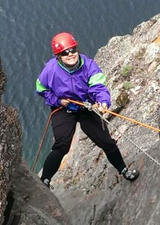Food safety and security through healthy wildlife
How can community-based wildlife health surveillance improve food safety and security in the Arctic?
Healthy wildlife populations are critical for ecosystem health, a productive economy, and food safety and security in the Arctic. Climate change, industrial development, change in species distributions, shifting trophic interactions, and other environmental changes are increasingly threatening the health and sustainability of wildlife species. Declining wildlife health affects Arctic communities by reducing availability and accessibility of important food sources, restricting intergenerational learning, and, in the case of zoonotic diseases and contaminants, posing health risks for those who handle and/or eat the animals.
Muskoxen and caribou are two iconic Canadian species that play important roles in the ecosystem and in the cultural, spiritual, and economic health of many northern communities. Recent population declines, with no evidence of recovery, of both species in the Kitikmeot and Inuvialuit regions are of substantial concern. In parallel, the increase occurrence and emergence of zoonotic diseases such as brucellosis, orf and erysipelas in hunted animals is also a Public Health issue that needs to be tackled.
We are partnering with communities and governments to establish and sustain community-based wildlife health surveillance in three communities (Kugluktuk and Cambridge Bay, Nunavut; Ulukhaktok, Northwest Territories). The program relies on three components to understand and track wildlife health: hunter-based sampling of harvested animals, documentation of Indigenous Ecological knowledge, enhanced reporting of diseases and abnormalities in wildlife.
With this approach, we combine:
- a cost-effective sample collection in remote locations
- the inclusion of Indigenous Knowledge as an essential body of knowledge for wildlife management, resulting in a balanced framework for bringing Indigenous and scientific knowledge together
- an early-warning system that allows a timely detection and response to possible disease threats to both animal and people
- capacity- and expertise building in the community
The program has already generated valuable results, providing a better and more holistic understanding of wildlife health and population dynamics. The program has promoted direct participation of local resource users from study design to results interpretation, fostered dialogue and trust among rightsholders and management partners, and ultimately contributed to the co-management decision-making process.
Project Team

Dr. Susan Kutz, DVM PhD
Professor, Ecosystem Public Health, Faculty of Veterinary Medicine

Juliette Di Francesco

Andrea Hanke


Filip Rakic, BSc
Project Partners


